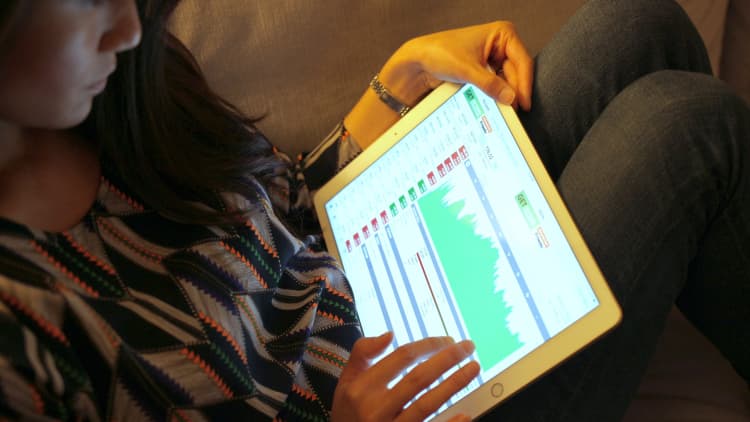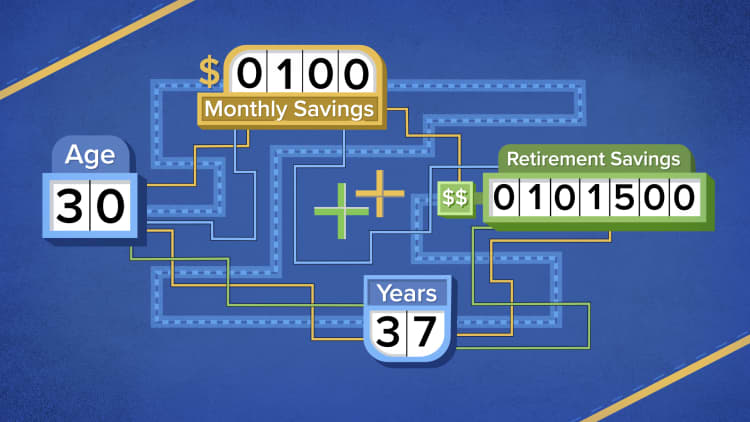No one wants to lose money.
So it's understandable that some people aren't on board with the idea of possibly losing hard earned savings in the stock market.
One common fear is that investing is like gambling — too risky. What about the crash of 2008 or Black Friday in 1989?
And don't forget the huge crash of 1929, still impacting some people nearly a century later.
More from Invest in You:
Inadequate emergency funds are even skimpier under the pandemic
Prices go up every year. That doesn't mean you have to pay more
If you need cash, try these less-obvious sources
Tawnya Redding's money habits were, in fact, shaped by the Great Depression. She is 33, but her great-grandparents faced substantial fallout back then.
"They lost everything," said Redding, a special ed teacher in Portland, Oregon.
Her great-grandfather, a musician, pivoted to teaching to earn a living, and drove around the countryside tuning pianos or bartering music lessons for food.
That left an indelible stamp on Redding's grandmother, Eleanor (Nellie) Smith, who spoke plainly to Redding about the importance of "saving, and not buying things on credit or buying things you can't afford," she said.
That caution made her grandparents leery of the stock market, and Redding grew up thinking that investing was risky. Aside from her teacher's pension, automatically deducted from her paycheck, Redding had everything in savings.
Redding's attitude began to change when she started a personal finance blog with a friend a couple of years ago. She began reading — Grant Sabatier's "Financial Freedom" was a big influence — and learning.
She realized the importance of keeping some money for an emergency.
"But for the long term, you should be investing it," she said. "Make your money work for you."
Another form of risk
Investing in the Dow Jones Industrial Average or the S&P 500 index is not like going to Vegas, says certified financial planner Dave Totah, senior wealth advisor at Exencial Wealth Advisors in Plano, Texas. "Las Vegas is weighted against you," he said.
Investing in the Dow Jones or the S&P 500, on the other hand, is putting your money into quality companies.
"They're going to go up over time," Totah said.

Even though people think they're not losing money by keeping their savings in cash, they actually are losing purchasing power, says Taylor Sundeen, a CFP and financial advisor at Great Waters Financial in St. Paul, Minnesota.
Cash doesn't earn any return and does not grow in value, so inflation erodes its purchasing power over time.
"Inflation is eye-opening for a lot of people," he said. Because inflation cuts into the purchasing power of your dollars, "it's a negative rate of return."
Paper losses
"Even if the stock market goes down, you haven't actually lost any money until and unless you sell your investments," said Priya Malani, a founding partner at financial planning firm Stash Wealth in New York.
Most important, your own risk tolerance might not serve you in the long run, Malani says. Look at the pattern of the stock market. "The fear of losing earned money is healthy, but with the ability to grow your money in a diversified portfolio over time, the odds are in your favor," she said.
The numbers today
March — when the Dow Jones dropped nearly 3,000 points and closed at 20,188.52 — could still be on some people's minds. The S&P 500 index that day hit its lowest level since December 2018.
How different it is now. The S&P 500 was up 50% over 100 trading days as of Saturday. The Dow Jones closed at 27,933 on Friday.
The lesson?
"The market will always have its down times," Sundeen said.
We'll always have risk and the possibility of a bear market. "It's not a matter of if, but when," Sundeen said. "That makes a case for having a diversified portfolio to weather the storms that come our way when the '08s come, or the 2020s."
Redding's experience helped her weather the drops earlier this year. "It was a little disheartening back in March," she said. But she stayed the course and is grateful for lessons learned.
"I didn't lose 20 grand," she said, though her portfolio was down by that amount. "I only lose that if I take it out. So now it's rebounded — now it's back to where it was, plus about eight grand [higher]."
Investing regrets
Heather Thornton, 46, wishes she'd had a different attitude toward finance years earlier.
"We'd be even better positioned," said Thornton, who retired two years ago from her job as a project manager in St. Paul, Minnesota.
"I fought against investing our money 20 years ago, and I do mean fought," she said. The argument took place every quarter. Her husband saw their checking account balance mounting to what she calls ridiculously high amounts, and he was all in favor of putting some into the stock market.
But she was afraid to invest. "I allowed my lack of knowledge and a few really bad investing years around 2000 be an excuse to drag my feet," she said. "I was afraid we would need it, and it wouldn't be there."
Then, three things happened. The market had years of steady upward growth. The couple felt their emergency savings was adequate to meet any situation. And Thornton started researching the stock market.

"It's easier than ever to seek out reliable information from books and websites," Thornton said. Keep things simple and affordable, she says, with low expense ratios and broad index funds, especially when you are just beginning.
"All the large firms, such as Vanguard, Fidelity and Schwab have their version of the all-market index fund," Thornton said. "It is the best place for a beginner to go.
Now, Thornton says, she manages their investments and keeps track of their asset allocation strategy. The biggest reward: Their investments allowed them to retire early.
SIGN UP: Money 101 is an 8-week learning course to financial freedom, delivered weekly to your inbox.
CHECK OUT: 'Shark Tank' winning CEO recommends 3 high-paying side hustles you can do from home via Grow with Acorns+CNBC.
Disclosure: NBCUniversal and Comcast Ventures are investors in Acorns.





